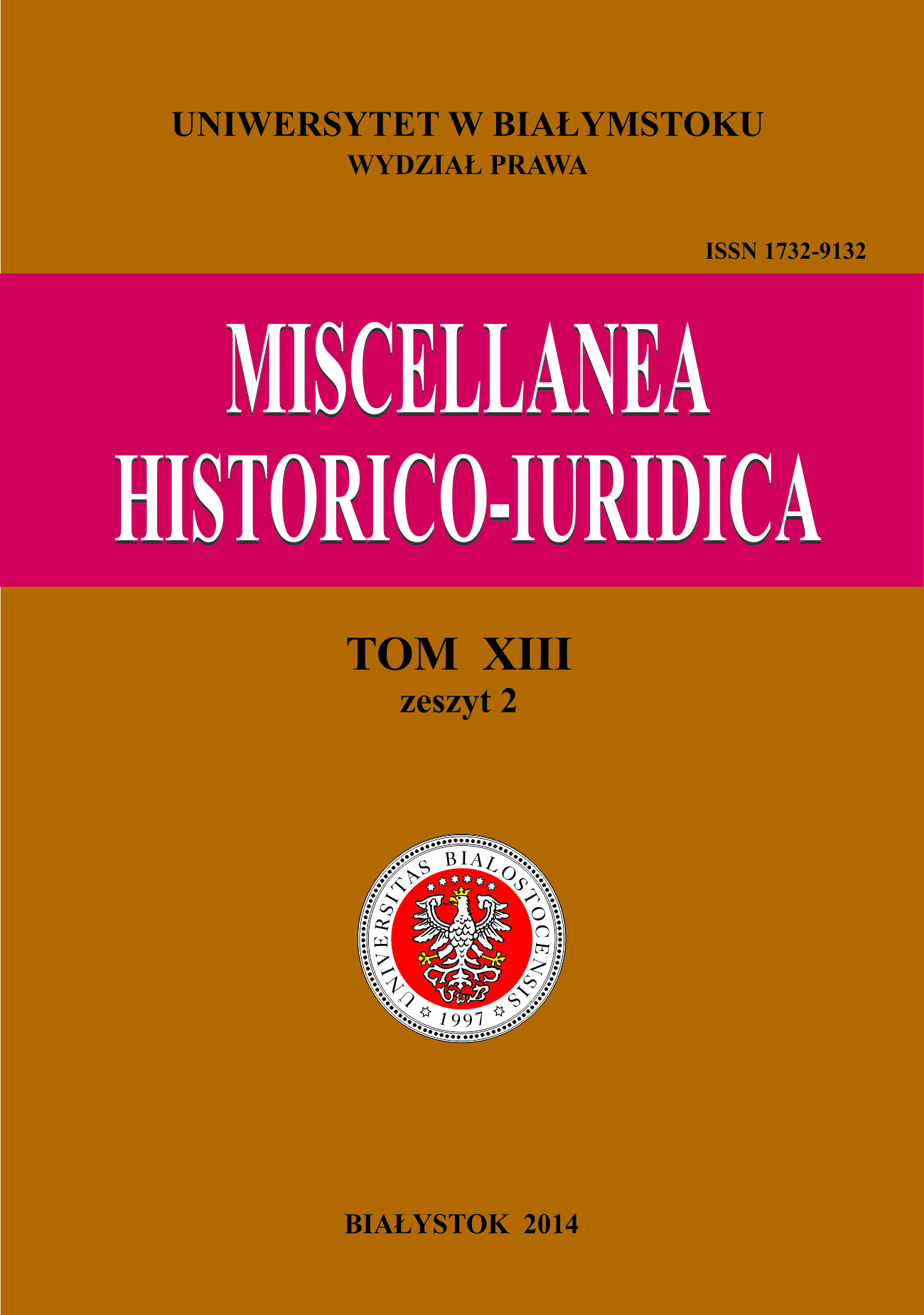Rights of Individuals Joined in a Civil Union in View of the Law of Criminal Procedure
Keywords:
same-sex couples, criminal procedure, the right to access the files of a case, the right to refuse to testify, the right to be excused from testifying, the right of succession after a deceased party of the proceedings, the right to appointed counsel, the right to apply for remand of a suspected person, the right to be notified of a preventive detention, the right to deposit bail, the right to take part in a trialAbstract
The article is an analysis of the rights which can be exercised in Polish criminal procedure by same-sex couples joined in a civil union. The key idea of the deliberation is an assertion that in criminal procedure – on account of the so called criminal procedure relation – the rights of people joined in same-sex unions are protected well enough, therefore alterations to the presented regulations are unnecessary. The authors make an argument, starting with demonstrating the legal definition of a closest person, next describing the following laws: the right to access the files of a case, the right to refuse to testify, the right to be excused from testifying, the right of succession after a deceased party of the proceedings, the right to appointed counsel, the right to apply for remand of a suspected person, the right to be notified of a preventive detention and to deposit bail, and to take part in a trial.
References
Doda Z., Gaberle A., Dowody w procesie karnym, Warszawa 1995.
Gajek J., O pojęciu faktycznego wspólnego pożycia w prawie karnym, „Palestra” 1972, nr 3.
Grajewski J. (red.), Steinborn S., Komentarz aktualizowany do art. 58 Kodeksu postępowania karnego, [w:] J. Grajewski (red.), L.K. Paprzycki, S. Steinborn, Komentarz aktualizowany do art. 1-424 ustawy z dnia 6 czerwca 1997 r. Kodeks postępowania karnego (Dz. U. 97.89.555), LEX/el., 2013.
Grzegorczyk T., Kodeks postępowania karnego. Komentarz, Zakamycze 2003.
Majewski J., [w:] A. Zoll, G. Bogdan, Z. Ćwiąkalski, P. Kardas, J. Majewski, J. Raglewski, M. Szewczyk, W. Wróbel, Kodeks karny. Część ogólna. Komentarz, t. 1: Komentarz do art. 1-116 k.k., Kraków 2004.
Marek A., Komentarz do kodeksu karnego. Część ogólna, Warszawa 1999.
Mozgawa M. (red.), Budyn-Kulik M., Kozłowska-Kalisz P., Kulik M., Kodeks karny. Komentarz, teza 4 do art. 115 §11 k.k., Lex, 2013.
Siewierski M., [w:] J. Bafia, K. Mioduski, M. Siewierski, Kodeks karny. Komentarz, Warszawa 1971.
Siostrzonek-Sergiel A., Partnerzy w związkach homoseksualnych a „osoby najbliższe” w prawie karnym, „Państwo i Prawo” 2011, z. 4.
Wojciechowski J., Kodeks karny. Komentarz. Orzecznictwo, Warszawa 1997.
Wolter W., [w:] I. Andrejew, W. Świda, W. Wolter, Kodeks karny z komentarzem, Warszawa 1973.
Zoll A., [w:] A. Zoll, G. Bogdan, Z. Ćwiąkalski, P. Kardas, J. Majewski, J. Raglewski, M. Szewczyk, W. Wróbel, Kodeks karny. Część ogólna. Komentarz, t. 1: Komentarz do art. 1-116 k.k., Kraków 2004.
Wyrok SN z 12 listopada 1975 r., V KR 203/75, OSP 1976, z. 10, poz. 187.
Wyrok SN z 31 marca 1988 r., I KR 50/88, OSNKW 1988, nr 9-10, poz. 71.
Postanowienie SN z 13 listopada 1996 r., III RN 27/96, OSNP 1997, nr 11, poz. 187.
Postanowienie SN z 7 lipca 2004 r., II KK 176/04, LEX nr 121668.
Postanowienie Sądu Najwyższego z 8 lutego 2006 r., IV KK 394/05, OSNwSK2006/1/306, LEX 333407.
Wyrok SA w Szczecinie z 21 grudnia 2006 r., II AKa 157/06, LEX nr 283401.
Wyrok SA w Katowicach z 15 marca 2007 r., II AKa 24/07, „Prokuratura i Prawo” 2007/11/26.
Postanowienie SN z 26 października 2011 r., I KZP 11/11, „Prokuratura i Prawo” – wkł. 2012/1/3.
Wyrok SA w Krakowie z 17 listopada 2011 r., II Aka 220/11, KZS 2011, z. 11, poz. 36.
Postanowienie SN z 4 lipca 2012 r., III KK 162/12, „Prokuratura i Prawo” – wkł. 2013/2/6.







